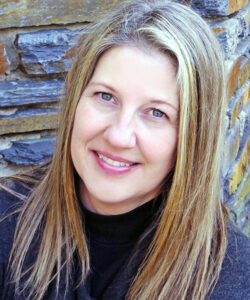Mete Civelek, PhD, an associate professor of Biomedical Engineering and a resident faculty at the Center for Public Health Genomics at the University of Virginia, served as the program chair for the 2023 Annual Meeting of the American Society of Human Genetics (ASHG) being held in Washington, DC from November 1–5. Beth Sullivan, PhD, a James B. Duke distinguished professor of molecular genetics and microbiology and associate dean for research training at Duke University School of Medicine has been tapped as the program chair for ASHG 2024 which will be in Denver, Colorado. In this Q&A, the outgoing and incoming program chairs discussed the process of planning this year’s meeting and highlighted some of the talks and presentations they are looking forward to. The conversation also covers some current trends in the human genetics space, what the future might look like, and even digs into some of the thinking around next year’s meeting. What follows is an edited version of the conversation.
GEN: As the current program chair, let’s talk a little bit about the process of planning this year’s event. What was that like? Do you have a sense for how many people are planning to be there this year?

ASHG 2023 Program Chair
Civelek: We’re expecting about 8,000 people, including trainees, exhibitors, scientists, geneticists from all around the world. The planning typically starts about nine months before the actual meeting, and the first step is obviously the formation of the new program committee. Every year we rotate off about one third of the committee. There are about 30 people on the committee—30 geneticists with varying expertise.
The scientific planning started in January. This year, we received about 60+ session proposals. Between January and March, we evaluate those proposals, sometimes there is a bit of a back and forth between the proposers and the program committee, over this period. And we ended up choosing 16 of them with topics of really varying interests. June is the deadline for abstracts, and we received over 3,500 abstracts. Each abstract is reviewed by four scientists, scored, and ranked. In July, the program committee comes together to create thematic sessions from those high scoring abstracts. By August, we finalized the scientific portion of the program. Of course, there’s workshops, training events, parties that the program committee doesn’t deal with.
GEN: This is a special year for ASHG, it’s 75th year as a society. Any special events planned to mark the anniversary at the conference this year?
Civelek: There are. One of the interesting things is many sessions are looking at the future of human genetics, of course, keeping in mind our history. ASHG earlier this year published a report on frankly, some of our troubled history. And from that came a lot of recommendations to perform genetics research in a much more thoughtful, equitable way. And there are many sessions about that. There’s one session this year called a distinguished speaker symposium, at the very end of the conference that’s forward-looking. The presidential symposium is also very forward-looking in terms of clinical applications. And then there is a special party on Saturday, November 4th the 75th anniversary party. The theme is one humanity, many genomes. That’s the theme for the entire annual meeting as well.
GEN: How did you select that theme?
Civelek: I think there is a much greater appreciation of performing human genetics research in a much more equitable way. There are two things I want to say about that. 16% of the world population is European ancestry, but 90% of the human genetics research and sequencing has been done in individuals with European ancestry. So, we’re missing so much of the genetic variation that is around the world. There are now programs that are trying to close that gap, for example, All of Us, the H3Africa project, Biobank Japan, the Human Pangenome Project. All of these things are a way for us to recognize that we’ve been missing a lot of the genetic variation, by focusing on European populations. The second thing is there are many genetic diagnostic tests. But these are expensive. Now there are efforts to make these technologies affordable and, and much more widely used around the world. And, since this is a major effort of human geneticists around the world, I think the one humanity, many genomes theme fits that.

ASHG 2024 Program Chair
Sullivan: One thing that will be highlighted throughout the meeting, but especially in the senior speaker symposium, is the fact that we now have a truly complete human genome as of 2022. This was a global effort to finish the human genome. That genome effort has really identified far more variation in the human genome than we anticipated. So, everything that Mete said is so important because that effort is now moving towards this human pangenome project to fully sequence individuals from a lot of different populations so that we can make better links between disease and clinical outcomes. I think that is an advance that is exciting for this meeting. But as we’re looking forward to the future, I think it’s going to become more normalized in the type of research that’s being done.
GEN: What are some presentations you are looking forward to? Any talks or tracks you’re most excited about?
Civelek: The presidential symposium is always interesting. And that’s going to be broadcast live also. This year’s theme is the clinical applications, the successful implementation of research into the clinic and the challenges of health access disparities. The second one is the distinguished speaker symposium, again, looking at the future of human genetics. It’s impossible to predict what the next 75 years is going to bring, but I think we can predict what the next 10 years is going to bring. So the symposium is really focused on that. The final thing is the plenary abstract sessions. So, there are 15 abstracts that were chosen because they scored the highest among the thousands of abstracts. I would say those three sessions, I’m looking forward to. Beth and I are chairing one of the plenary sessions.
Sullivan: I think the plenary sessions and obviously the, the two symposia that Mete talked about. The plenary sessions, I always love, because the breadth of science that’s presented really represents the society and the community of researchers and clinicians that we have. It includes trainees, so we’re going to have graduate students presenting, and established investigators. I’m really excited about some of our invited sessions. There’s a session on the ENCODE project. This session’s going to be exciting because I think ENCODE has been erroneously viewed in the past as just a classification or categorization of the genome. But what’s going to be presented this time will be how this is functionally relevant. So how the information can be applied to understanding how the genome functions and how that’s related to disease.
GEN: Looking at the field of human genetics more broadly, what are some of the developments that you’re excited about and, and potential applications that you’re most looking forward to seeing? What are some of the trends that are starting to emerge?
Sullivan: More precision. I think there’s more precision in how that the genomic information is being applied to the clinic. Wouldn’t you agree?
Civelek: Totally agreed. Primarily in the rare disease space. There’s a lot of activity with antisense oligos, CRISPR technologies that are coming into clinic. Studying more diverse populations is not going to go away. It’s going to intensify because we’re learning so much more. Equitable access to genomic medicine, I think, by making things cheaper, portable, and things like that. I think there’s going to be a lot of engineering, [associated with] that. Our discipline is very technology driven. Like Beth said, the pangenome project occurred because long read sequencing became widely available. The clinical applications are happening because the antisense oligos are proven safe, CRISPR Cas-9 delivery systems are now safely doable. I think technology is going to really drive the genomic medicine. Also, there’s going to be increased effort to understand the function of the non-coding genome.
Sullivan: To build on that last comment that Mete made, I’m excited to think about the future of how we’re understanding complex structural variation. Now that we have complete telomere to telomere genomes, we’re actually able to make connections between complex rearrangements and variants that we just couldn’t span before. I’m a little bit biased here because I was trained as a cytogeneticist. This meeting, 25 years ago, was heavily focused on chromosome abnormalities. Since technology has advanced, it’s been more molecular diagnostics. But there’s this whole group of unexplained cytogenetic abnormalities and undiagnosed clinical conditions that I think ultra long resequencing will allow us to bridge now. The other thing that I wanted to mention is that artificial intelligence is here and being used to predict disease from genetic information and to identify the most appropriate therapies for certain clinical conditions. I’m excited to see how the researchers in our society are going to be using AI. I think that’s an area for us to keep our eye on for the future.
GEN: AI is definitely very interesting to a lot of people. I think most people see the benefits and are open to the possibilities but there are concerns.
Sullivan: And I think your point is well taken. The ethics of using AI will be central to the conversations that the members of the society have. What is the responsible use of AI and how much human curation is needed even after an analysis is done? These are all issues that are going to be coming up over the next several years for sure.
GEN: As incoming chair, I imagine you’ve seen some of the planning process over the last year. Its still early but what are you thinking for 2024?
Sullivan: I’ve learned a lot. I can’t really predict what next year’s meeting will look like. But my goal as the incoming chair is to just always present the best [and] the most interesting science. We have some clever researchers in our community that are looking at problems in genetics and genomics in unique and creative ways. So, I hope that we can highlight those researchers.
I also think a lot about how we’re communicating science. In my professional life, I go out a lot into faith communities where I think there are gaps between understanding of science and how to apply it. And I want us to think about our role as scientists to engage with the public in a way that’s educational, so that the public can be better informed. Precision medicine is here, so that means that patients need to understand what their responsibility is. And finally, although this has been our goal all along this year and in past years, I really want this meeting to be accessible to new attendees, to trainees, and to our established long-term members.
GEN: I appreciate what you said about the importance of communicating science in ways that are informational and educational, especially as we begin using novel technologies such as CRISPR to treat disease. Clear communication can go a long way to help people to feel comfortable.
Sullivan: Absolutely. I was at a local ethics conference in Raleigh recently, and I was invited to speak to lay people who had attended. Many of our medical centers are doing whole genome sequencing [studies] and people are being asked to be part of these studies and it was clear the public doesn’t understand what it means. It is part of our responsibility to make sure we’re explaining to the public that there are good reasons to be part of these clinically relevant genome studies. It’s a personal choice if someone wants to do it, but there are very good reasons that will help the patient themselves as well as countless others.


